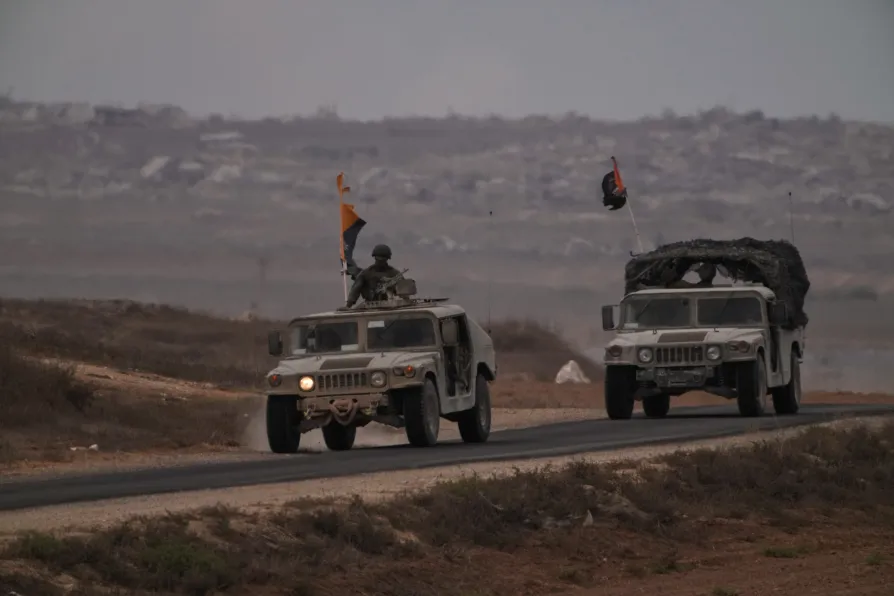
 Israeli soldiers move near the Israeli-Gaza border, as seen from southern Israel, October 9, 2025
Israeli soldiers move near the Israeli-Gaza border, as seen from southern Israel, October 9, 2025
UNYIELDING vigilance is needed to ensure Israel fulfils its commitments under the “ceasefire.”
Palestinians streamed back to Gaza City to confront anew the now familiar scenes of destruction with their homes and businesses, schools and hospitals, mosques and churches heaped in ruins with vital infrastructure fractured and broken.
This is no natural disaster but is made by the Israeli war machine, which exercises genocidal power only because Israel benefits from an unending stream of cash from the US and the military, logistical, economic and political support of imperialist states, with Britain among them.
The scale of Britain’s covert and open assistance to the Israeli war machine is to the everlasting shame of our nation. Every drone, electronic component, military device, munition, and weapon supplied to the Israeli Offence Force has been supplemented by full-scale intelligence co-operation, shared surveillance data and the diplomatic support that has enabled Israel to wage its war despite the underlying economic crisis, which makes this state a welfare junkie.
As winter approaches, it will be necessary to find adequate shelter, repair broken power, water and sewerage lines, reconstruct basic health and education services, find ways to deal with the human damage with thousands missing limbs, carrying grievous wounds, and the psychological effects of the unremitting genocide carried out over the past years.
Over the next days, hundreds of Palestinian hostages held in Israeli prisons are due to be released alongside the bodies of Israelis, living and dead, held in Gaza.
As a token of Israel’s long-standing policy to fracture Palestinian civil society, it is refusing to release Marwan Barghouti, who is the figure internationally recognised as possessing the stature to effect a renewed sense of unity and national purpose.
It is the steadfast resistance of Palestinian society — combined with the scale of international condemnation of Israel’s policy of genocidal killing — that has produced this rupture in imperialism’s strategy.
Our efforts must be devoted to doing what is possible in these new conditions to allow Palestinian society to recover from this latest episode in its national trauma.
While it is clear that the national aspirations of the Palestinian people — dispersed in Israel itself, in Gaza, in the Occupied Territories, in the global diaspora and in numberless refugee camps in the countries that neighbour Palestine’s historic land — cannot be met without a state of their own with an Israel within the 1967 boundaries — it is also true that profound changes must take place in Israeli society.
If this setback to Netanyahu’s strategy of unending hostility endures, it may be possible for a different politics to emerge within Israel.
Israel was founded when many European Jews, traumatised by the Holocaust, displaced from their lands of birth and refused sanctuary in the West, found a home in Palestine. The original zionist leaders of this settler state knew they were to be locked in an eternal conflict with the people they displaced in pogrom and war. But the reality is that Israel is also the home of new generations who know no other home, plus over a million Jewish people fleeing from countries that neighbour historic Palestine.
An Israeli nation — riven by its own problems and class contradictions — nevertheless exists as something distinct from the Jewish people as a whole.
It is possible, indeed desirable, that this ceasefire allows the development of a new politics in Israel grounded in a realistic assessment of a future in which imperialism is no longer able to offer a security guarantee for a settler state in perpetual conflict with the Palestinian people and their neighbouring states.
If this is possible, it necessitates a profound change in British policy. In the meantime, while the Palestine solidarity movement maintains its vigilance, we must campaign for material aid and offer to raise a construction brigade to help in the reconstruction.










